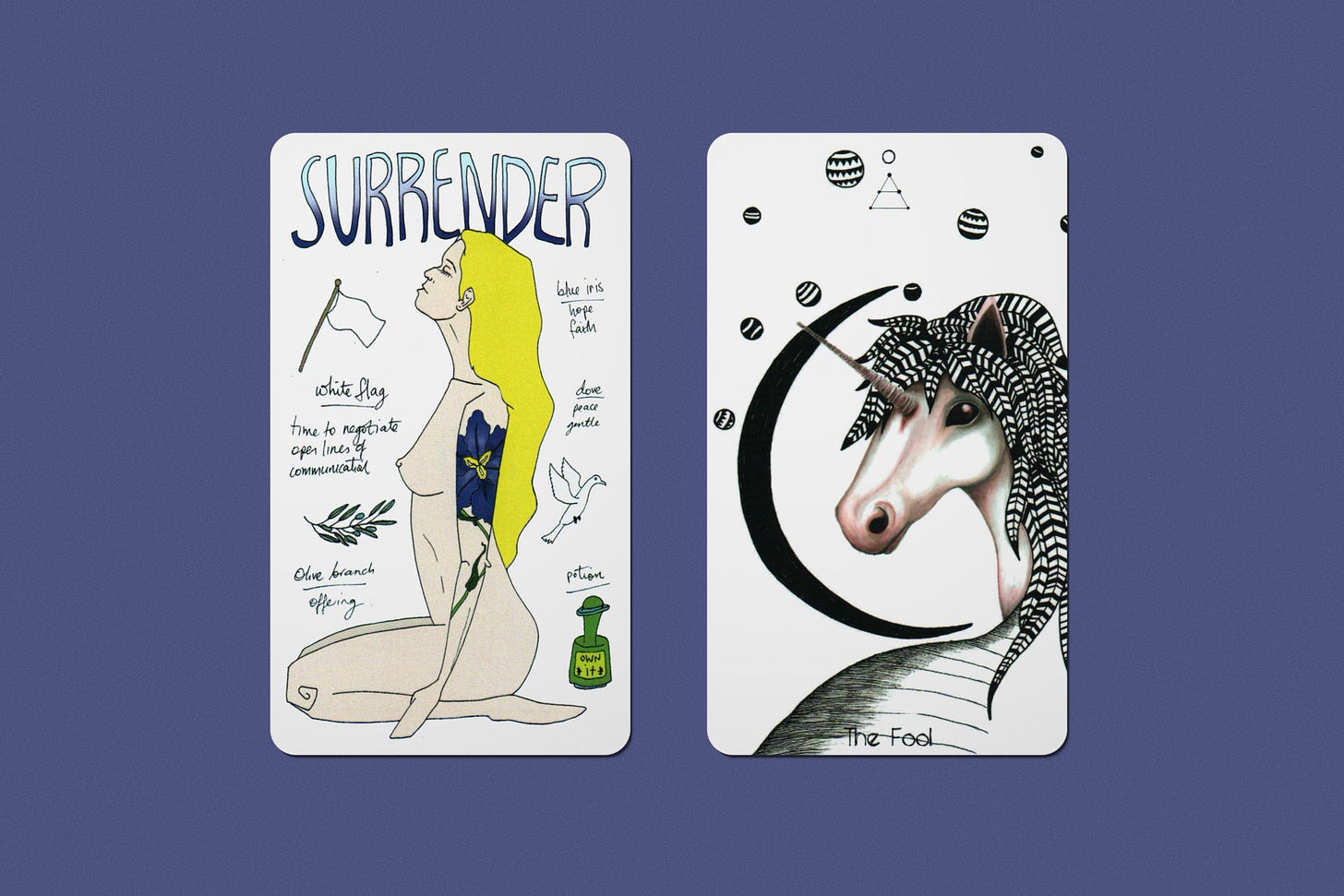If you’re new to The Rebel MFA Way, welcome! This is my daily work for my Write by the Cards: 30 Day Challenge that I’m hosting. Learn more here. Scroll down to the end to see my behind-the-scenes commentary and source material.
UPDATE NOTE:
One of the most helpful things I’ve learned about the creative life is to go where the energy is at instead of forcing things that I “think” I should be doing (surrendering). And pulling these two cards actually confirmed it.
Right now, my energy is pulling me toward a different type of fiction writing (as you could probably tell with the last few days of the challenge). So instead of writing a short story narrative. I’m going to try something new (the fool!) and move toward rewriting and re-telling myths for the remaining days. I know it’s a shift but hey! That’s exactly what these challenges are all about — being okay with and being willing to pivot. Plus as anthropologist, Maya Deren says:
“Myth is the facts of the mind made manifest in a fiction of matter.”
You already got a large taste of Vasalisa and Baba Yaga’s.
And today, I’m choosing to retell a myth that is very potent for the moment.
Day 5 Prompt — As they moved forward, a new challenge emerged: {draw a card}.
Day 6 Prompt — Just when the character felt lost, they encountered a guide: {draw a card}.
The Story of Pandora’s Box {Greek Myth}
I am your purgatory.
But I am also your hope.
Though I have been molded from the rough
and calloused hands of a mere man,
I am beautiful.
I am ugly.
I am balance.
I am duality.1
Gods have gifted me,
cursed me.
I am both a treasure
and a calamity.2
Like all origin stories,
mine is of necessity.
Involuntary you might
say, I didn’t ask to become a woman.
To be given as punishment
by a jealous God with a dick.3 [3]
But what you didn’t count on is
curiosity
and
hope
go hand-in-hand.4 [4]
I may have opened the box,
but I saved the most important
thing in there.
Hope.
And you know,
I find it funny that
no gods ever realized
that hope and curiosity live in the veins
of women.
And we will never stop hoping,
for a life
that is kind and just
and wonderfully curious.
Behind-the-Scenes Commentary
If you TLDR’d my note above, go back and read it now otherwise you’ll probably get to the end of this and be like, wtf is going on. Go ahead, I’ll give you a minute.
• • •
Great, now that you’re caught up, let’s chat about this because this was… unexpected.
I mean, not only the pivot, but the piece itself. My goal when I started was to tell a straight-forward story about Pandora, but I started with the first “verse” and the rest just poured out until it was done. No stopping, no thinking, it all just flowed.
Then I heard Agatha (my writing spirit guide) whisper: “All done for today.” I listen to her. So a half prose-y poem is what it is. I don’t hate it! I just didn’t expect it.
Source Material
The Story of Pandora’s Box
Hesiod’s account of humanity’s mythic origins, Works and Days, man was first created alone, with no female mate to accompany him on his journey through the world. Woman would make her first appearance not as man’s helpmate and partner, but as his punishment. [DK. The Mythology Book: Big Ideas Simply Explained (DK Big Ideas) (p. 78). DK. Kindle Edition.]
The other Olympians then added their own contributions to the woman’s make-up: Aphrodite gave her beauty and attractiveness; Athena gave her skill in sewing; Hera gave her curiosity; and so on. Hermes, the gods’ messenger, gave woman the power of speech to help her communicate—but he also gave her the dangerous gift of guile. This new woman was enchanting in her beauty, seductive in her softness, inspiring in her smile, and soothing in her gentleness. In light of these traits, she was given the name Pandora (literally meaning “all gifts”). [DK. The Mythology Book: Big Ideas Simply Explained (DK Big Ideas) (pp. 78-79). DK. Kindle Edition.]
Zeus concluded that in order to correct the balance between divine and human power, some great calamity in the world was required. That calamity was woman. On Zeus’s orders, the blacksmith and fire god Hephaestus set to work, shaping soft clay into a female mate for man. [DK. The Mythology Book: Big Ideas Simply Explained (DK Big Ideas) (p. 78). DK. Kindle Edition.]
Although she had been warned against opening the pithon, it was her innocent curiosity—a characteristic given by Hera—that led to her downfall. When she could not resist peeping inside the jar, she pulled back the lid, and all the ills and misfortunes of the world flew out: Hunger, Sickness, Loss, Loneliness, and Death. Horrified, Pandora hastily pushed the lid back on—just in time to prevent Hope from escaping. With hope, the world could still persevere, despite the adversity that the jealous Zeus had inflicted on mankind. [DK. The Mythology Book: Big Ideas Simply Explained (DK Big Ideas) (pp. 79-80). DK. Kindle Edition.]








